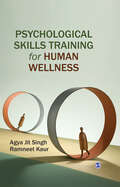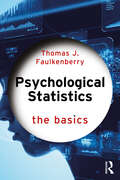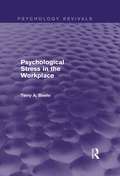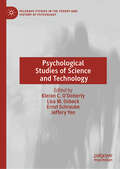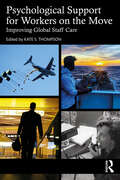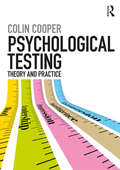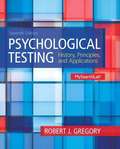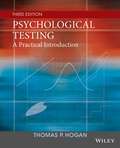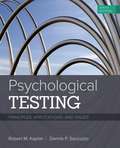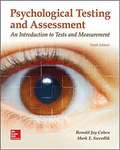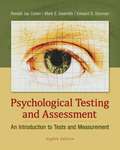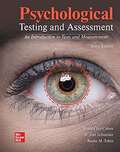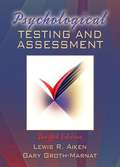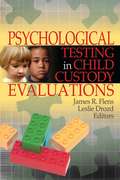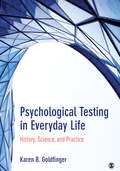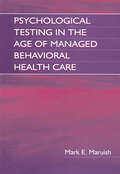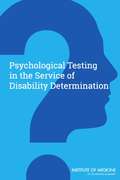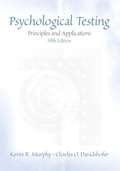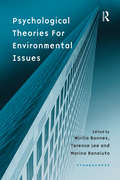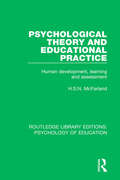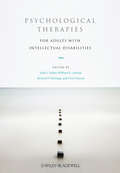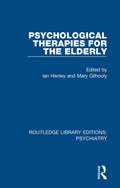- Table View
- List View
The Psychological Significance of the Blush
by W. Ray Crozier Peter J. de JongThe blush is a ubiquitous yet little understood phenomenon which can be triggered by a number of self-conscious emotions such as shame, embarrassment, shyness, pride and guilt. The field of psychology has seen a recent surge in the research of such emotions, yet blushing remains a relatively neglected area. This unique volume brings together leading researchers from a variety of disciplines to review emerging research on the blush, discussing in depth issues that have arisen and stimulating new theorizing to indicate future directions for research. Topics covered include: the psychophysiology of the blush; developmental aspects; measurement issues; its evolutionary significance and the role of similar colour signals in the social life of other species; its relation to embarrassment, shame and social anxiety; and the rationale for, and clinical trials of, interventions to help people suffering from blushing phobia.
Psychological Skills Training for Human Wellness
by Agya Jit Singh Ramneet KaurPsychological skills training (PST) involves learning essential psychological skills that help the human mind to function at a high level, irrespective of circumstances. The major skills include stress management, resilience, self-motivation, self-confidence, sustaining focus, leadership, goal setting and planning, conflict resolution, time management and communication skills. PST programmes involve directions, practice and feedback in order to learn these skills effectively. PST is used in a variety of educational, professional, sporting and health settings. Psychological Skills Training for Human Wellness provides a comprehensive reference to all aspects of PST and presents a holistic view of the subject area. It shows how PST serves the needs of multiple domains and user groups of different ages and at various life stages. It covers each area of skill development in detail. The book will prove to be an indispensable source for academic and research psychologists and will be highly useful for professional psychologists interested in the implementation of PST for their clients.
Psychological Statistics: The Basics (The Basics)
by Thomas J. FaulkenberryPsychological Statistics: The Basics walks the reader through the core logic of statistical inference and provides a solid grounding in the techniques necessary to understand modern statistical methods in the psychological and behavioral sciences. This book is designed to be a readable account of the role of statistics in the psychological sciences. Rather than providing a comprehensive reference for statistical methods, Psychological Statistics: The Basics gives the reader an introduction to the core procedures of estimation and model comparison, both of which form the cornerstone of statistical inference in psychology and related fields. Instead of relying on statistical recipes, the book gives the reader the big picture and provides a seamless transition to more advanced methods, including Bayesian model comparison. Psychological Statistics: The Basics not only serves as an excellent primer for beginners but it is also the perfect refresher for graduate students, early career psychologists, or anyone else interested in seeing the big picture of statistical inference. Concise and conversational, its highly readable tone will engage any reader who wants to learn the basics of psychological statistics.
Psychological Stress in the Workplace (Psychology Revivals)
by Terry A. BeehrOriginally published in 1995, this book was the most up-to-date and comprehensive account of research on occupational stress at the time. It identifies the sources, consequences and treatments of stress in the workplace from the perspective of organizational psychology and makes clear recommendations for future work in this area. Terry Beehr discusses how role ambiguity and conflict act as stressors in the workplace, and discusses the characteristics of the job and the organization itself that can adversely affect performance. He examines the effects of stress in the workplace and describes methods that can be used to alleviate the problem, both at the individual and organizational level. In addition, the book is illustrated with many examples from field research over the author’s twenty years of experience in studying the workplace. This book will be of considerable interest to students and researchers in occupational psychology, as well as managers and trainers. Terry Beehr is still working in this field today.
Psychological Studies of Science and Technology (Palgrave Studies in the Theory and History of Psychology)
by Lisa M. Osbeck Ernst Schraube Kieran C. O’Doherty Jeffery YenThis book provides a significant contribution to scholarship on the psychology of science and the psychology of technology by showcasing a range of theory and research distinguished as psychological studies of science and technology. Science and technology are central to almost all domains of human activity, for which reason they are the focus of subdisciplines such as philosophy of science, philosophy of technology, sociology of knowledge, and history of science and technology. To date, psychology has been marginal in this space and limited to relatively narrow epistemological orientations. By explicitly embracing pluralism and an international approach, this book offers new perspectives and directions for psychological contributions. The book brings together leading theorists and researchers from around the world and spans scholarship across a variety of traditions that include theoretical psychology, critical psychology, feminist psychology and social constructionist approaches. Following a historical and conceptual introduction, the collection is divided into three sections: Scoping a New Psychology of Science and Technology, Applying Psychological Concepts to the Study of Science and Technology and Critical Perspectives on Psychology as a Science. The book will interest interdisciplinary scholars who work in the space of Science and Technology Studies and psychologists interested in the diverse human aspects of science and technology.
Psychological Support for Workers on the Move: Improving Global Staff Care
by Kate S. ThompsonThis book examines the psychological pressures faced by workers who migrate for short periods, exploring what it means to work in high- stress environments, often on time- limited contracts and with low levels of support; and how best to protect this kind of key worker. The text addresses three central questions. First, how we can think about the experiences of workers on the move? Second, what forms of support given by who, and when, provide the best staff care? Finally, how can appropriate and timely staff support by organisations influence the lives of workers on the move? The authors, all psychological therapists and many former international workers, offer recommendations for workers in humanitarian aid, the mission sector, international contracting and seafaring, among others, taking into account the changing world of work, and the impact on this of the Covid-19 pandemic. Psychological Support for Workers on the Move provides essential guidance to organisations posting personnel internationally, to psychological and wellbeing therapists working with them, and to individual workers themselves
Psychological Testing: Theory and Practice
by Colin CooperPsychological tests are everywhere. They are widely used by practitioners, researchers, clinicians, and educators -anyone, in fact, who needs to measure various aspects of personality, cognitive abilities, mood and suchlike. Psychometrics is the science of psychological assessment. It covers the construction, use and interpretation of psychological tests of all kinds – from simple questionnaires measuring personality, moods and attitudes, through to specialised tests measuring IQ and other mental abilities. Psychological Testing: Theory and Practice provides test users, test developers, practitioners and researchers in the social sciences, education and health with an evaluative guide to choosing, using, interpreting and developing tests. Its aim is to give readers a thorough grasp of the principles (and limitations) of testing, together with the necessary methodological detail. Unusually for an introductory text, it includes coverage of several cutting-edge techniques. If you find mathematics frightening and statistics dull, this engaging text will help you to understand the fundamental principles of psychometrics, that underpin the measurement of any human characteristic using any psychological test. The book is accompanied by additional resources, including a set of spreadsheets which use simulated data and other techniques to illustrate important issues, and allow users to understand various statistical procedures work, without getting bogged down in mathematical detail. These are fully integrated into the text. This is an essential introduction for all students of psychology and related disiplines, as well as a useful resource for practitioners and those seeking accreditation in psychological testing.
Psychological Testing
by George Domino Marla L. DominoB>" Unique in both perspective and approach, this book exposes readers to the entire panorama of psychological testing -- covering all major classic and contemporary topics -- but "without" overwhelming detail. Comprehensive -- but not encyclopedic -- and cross-culturally relevant, it conveys in exceptionally clear language the "excitement" associated with psychological testing, and teaches basic principles through concrete interconnected examples. Focusing on " testing the individual" rather than on testing in general and specific formulas, it is both academic and applied in perspective -- reflecting the author's varied experience in industry, in a counseling center, and in other service oriented settings, and extensive academic training in clinical psychology. Addresses "basic issues" regarding The Nature of Tests; Test Construction, Administration, and Interpretation; and Reliability and Validity. Considers the various "dimensions" of testing: Personality; Cognition; Attitudes, Values, and Interests; Psychopathology; Normal Positive Functioning. Details the "applications" of testing with a variety of populations: Special Children; The Elderly; Testing in a Cross-Cultural Context; Disability and Rehabilitation. Discusses the various settings of testing: Testing in the Schools; Occupational Settings; and Clinical and Forensic Settings. Presents the current "challenges to testing: " The Issue of Faking; The Role of Computers; and Testing Behavior and Environments. Outlines the History of Testing. For anyone interested in psychological testing in a broad range of settings.
Psychological Testing: History, Principles, and Applications 7th Edition
by Robert J. GregoryEstablishes a solid foundation of knowledge about psychological testing Psychological testing impacts virtually every corner of modern life, from education to vocation to remediation.
Psychological Testing: A Practical Introduction (3rd Edition)
by Thomas P. HoganTom Hogan's Psychological Testing: A Practical Introduction, Third Edition emphasizes active learning strategies to provide a practical introduction to the field of testing in Psychology and allied disciplines. A rigorous yet accessible text, Psychological Testing is uniquely written as a learning device as opposed to a reference work, encouraging readers to apply the material they are learning to real-life, contemporary situations.
Psychological Testing: Principles, Applications, and Issues
by Robert M. Kaplan Dennis P. SaccuzzoPsychological Testing: Principles, Applications, and Issues, Ninth Edition explains the fundamentals of psychological testing, their important applications, and the controversies that emerge from those applications in clinical, education, industrial, and legal settings. Kaplan and Saccuzzo's engaging and thorough text demonstrates how psychological tests are constructed and used, both in a professional setting and in everyday lives. Part I focuses on the core concepts that affect the evaluation of all tests. Part II discusses the major types of psychological tests, while Part III looks at present-day issues affecting testing such as stereotype threat, bias, laws, and ethics. A multitude of test profiles and sample items illustrate how psychological testing is used and reported. Real-life case studies demonstrate the uses and misuses of psychological testing, while "Technical Example" boxes help you understand complex statistical concepts.
Psychological Testing And Assessment
by Ronald Jay Cohen Mark E. SwerdlikPsychological Testing and Assessment presents students with a solid grounding in psychometrics and the world of testing and assessment. The book distinguishes itself through its logical organization and many pedagogical aids, including the “Meet an Assessment Professional” feature in every chapter that highlights the works of important academics and practitioners in the field. Now in its ninth edition, this program has consistently won enthusiastic reviews not only for its balance of breadth and depth of coverage, but for content that brings a human face to the assessment enterprise. The Connect course for this offering includes SmartBook, an adaptive reading and study experience which guides students to master, recall, and apply key concepts while providing automatically-graded assessments. McGraw-Hill Connect® is a subscription-based learning service accessible online through your personal computer or tablet. Choose this option if your instructor will require Connect to be used in the course. Your subscription to Connect includes the following: • SmartBook® - an adaptive digital version of the course textbook that personalizes your reading experience based on how well you are learning the content. • Access to your instructor’s homework assignments, quizzes, syllabus, notes, reminders, and other important files for the course. • Progress dashboards that quickly show how you are performing on your assignments and tips for improvement. • The option to purchase (for a small fee) a print version of the book. This binder-ready, loose-leaf version includes free shipping. Complete system requirements to use Connect can be found here: http://www.mheducation.com/highered/platforms/connect/training-support-students.html
Psychological Testing and Assessment: An Introduction to Tests and Measurement (Eighth Edition)
by Ronald Jay Cohen Mark E. Swerdlik Edward Sturman.Psychological Testing and Assessment presents students with a solid grounding in psychometrics and the world of testing and assessment. The book distinguishes itself through its logical organisation, readable text, and many pedagogical aids, such as the “Meet an Assessment Professional” feature in every chapter which highlights the works of people such as Dr. Stephen Finn, architect of therapeutic assessment. Now in its eighth edition, this text has consistently won enthusiastic reviews not only for its balance of breadth and depth of coverage, but for content that brings a human face to the assessment enterprise.
Psychological Testing and Assessment: An Introduction to Tests and Measurement
by Renée Margaret Tobin William Joel Schneider Ronald Jay CohenPsychological Testing and Assessment: An Introduction to Tests and Measurements, 10th edition, is a measurement textbook that provides a sound grounding in psychometrics using a logical organization and pedagogical aids. <p><p>The book is scholarly and authoritative while having a "hands-on" feel due to the authors' experience administering, scoring, and interpreting tests in various contexts. The content brings a human face to testing and assessments while balancing breadth and depth of coverage.
Psychological Testing and Assessment (12th edition)
by Lewis R. Aiken Gary Groth-MarnatThe aim of this text is to improve the knowledge, understanding, and practices of persons who construct tests, take tests, and ponder over the meaning and value of test scores. The emphasis is on psychological testing in educational, clinical, and industrial settings. Included is a detailed study guide divided among the 15 chapters and four appendices, as well as overviews, boldfaced terms and names, exercises, and, of course, tests. An MS-DOS diskette containing accompanying programs to construct, administer, and score tests can be obtained free of charge from the author. Annotation c. by Book News, Inc. , Portland, Or.
Psychological Testing in Child Custody Evaluations
by Leslie Drozd James R. FlensA focused look at the uses-and misuses-of psychological tests in the context of child custodyThis book presents an advanced examination of psychological testing and usage in the child custody arena. It addresses test selection issues, provides insightful discussions of how to confront confirmatory biases and avoid the distortion of test findings, and presents clear instructions for the use of specific tests, including MMPI-2 and Rorschach, and a point/counterpoint discussion of the strengths and weaknesses of the Ackerman-Schoendorf Scales for Parent Evaluation of Custody (ASPECT).Psychological Testing in Child Custody Evaluations can be viewed as a work in three parts. The first section addresses theoretical and test usage issues, with chapters focusing on: addressing test selection issues from legal and psychological perspectives bias issues that interfere with the evaluator&’s ability to collect and consider data objectively a functional, comprehensive approach to the use of psychological tests in a child custody evaluation-with a conceptual framework for choosing assessment techniques to assess parenting competencies and other variables important in forming opinions about custodial placement and visitation access, and a practical example of how to present psychological test data in an advisory report to the court a look at psychological testing from an attorney&’s point of viewThe second section of Psychological Testing in Child Custody Evaluations focuses on the MMPI-2 and the Rorschach Inkblot Test in the child custody context, investigating hypotheses that can be inferred from the MMPI-2 regarding parenting behaviors, and the use and value of the Rorschach. This section examines: the foundation from which the MMPI-2 can generate expectations regarding five basic issues-the quality of attachment and bonding, potential for antisocial behavior, temper control, alienation of affection, and chemical abuse and dependence the range of variables that will generate useful hypotheses regarding parent-child interactions and family systems the effects of the circumstances of litigation on score elevations-including recommended limits as to how much elevation can be dismissed as only contextual the important differences between occasion validity and attribute validity the clinical application of an objective interpretation system, including the courtroom credibility of explicit convergent validity the use of the Rorschach in child custody evaluations findings from a study using the Rorschach to address specific parenting variablesThe third section of Psychological Testing in Child Custody Evaluations is a focused point-counterpoint discussion of ASPECT, between test creator Marc J. Ackerman and Mary Connell, President of the American Academy of Forensic Psychology. This book is essential reading for child custody evaluators, family law attorneys, and judges practicing in the family law arena, as well as educators and students in these fields.
Psychological Testing in Everyday Life: History, Science, and Practice
by Karen B. GoldfingerPsychological Testing in Everyday Life explores how psychological testing is used in real-life settings to make the study of psychometrics interesting, relevant, and highly accessible. Author Karen B. Goldfinger examines a broad range of carefully selected topics to capture student interest, encourage critical thinking, and spark class discussions. Organized in the form of an applied casebook, each chapter presents the complex issues that arise when using psychological tests in a variety of settings, providing an in-depth view of psychological testing practices, historically and in the present. This unique text will support students in becoming thoughtful, informed consumers and providers of psychological assessment.
Psychological Testing in Everyday Life: History, Science, and Practice
by Karen B. GoldfingerPsychological Testing in Everyday Life explores how psychological testing is used in real-life settings to make the study of psychometrics interesting, relevant, and highly accessible. Author Karen B. Goldfinger examines a broad range of carefully selected topics to capture student interest, encourage critical thinking, and spark class discussions. Organized in the form of an applied casebook, each chapter presents the complex issues that arise when using psychological tests in a variety of settings, providing an in-depth view of psychological testing practices, historically and in the present. This unique text will support students in becoming thoughtful, informed consumers and providers of psychological assessment.
Psychological Testing in the Age of Managed Behavioral Health Care
by Mark E. Maruish E. Anne NelsonWritten by a recognized expert in assessment employed by a large managed behavioral healthcare organization (MBHO), this book seeks to provide psychologists who rely on testing as an integral part of their practice, a guide on how to survive and thrive in the era of managed behavioral healthcare. It also offers ideas on how to capitalize on the opportunities that managed care presents to psychologists. The goal is to demonstrate that despite the tightening of the reins on authorizations for reimbursable testing, psychological testing can continue to play an important role in psychological practice and behavioral healthcare service delivery. The book presents ideas for: *increasing the likelihood of getting tests authorized by MBHOs; *using inexpensive/public domain assessment instruments; *ethically using psychological testing in MBHO settings; *capitalizing on the movement to integrate primary care and behavioral healthcare through the use of psychological testing; and *designing and implementing outcomes assessment systems within MBHO settings. Intended for practicing psychologists and other behavioral health practitioners employed by MBHOs in direct service delivery, care management or supervisory positions, as well as for graduate clinical or counseling psychology students who will most likely work in MBHO settings.
Psychological Testing in the Service of Disability Determination
by Committee on Psychological Testing Including Validity Testing for Social Security Administration Disability DeterminationsThe United States Social Security Administration (SSA) administers two disability programs: Social Security Disability Insurance (SSDI), for disabled individuals, and their dependent family members, who have worked and contributed to the Social Security trust funds, and Supplemental Security Income (SSSI), which is a means-tested program based on income and financial assets for adults aged 65 years or older and disabled adults and children. Both programs require that claimants have a disability and meet specific medical criteria in order to qualify for benefits. SSA establishes the presence of a medically-determined impairment in individuals with mental disorders other than intellectual disability through the use of standard diagnostic criteria, which include symptoms and signs. These impairments are established largely on reports of signs and symptoms of impairment and functional limitation. "Psychological Testing in the Service of Disability Determination" considers the use of psychological tests in evaluating disability claims submitted to the SSA. This report critically reviews selected psychological tests, including symptom validity tests, that could contribute to SSA disability determinations. The report discusses the possible uses of such tests and their contribution to disability determinations. "Psychological Testing in the Service of Disability Determination" discusses testing norms, qualifications for administration of tests, administration of tests, and reporting results. The recommendations of this report will help SSA improve the consistency and accuracy of disability determination in certain cases.
Psychological Testing Principles and Applications (5th edition)
by Kevin C. Murphy Charles O. DavidshoferStep by step guide to psychological tests
Psychological Theories for Environmental Issues (Ethnoscapes)
by Mirilia BonnesEnvironmental psychology is an increasingly important area of research, focusing on the individual and social factors responsible for many critical human responses to the physical environment. With such rapid and widespread growth, the main theoretical strands have often been left unclear and their scientific and practical implications have been underdeveloped. This essential and stimulating book contextualizes and critically analyzes the main theoretical ideas. It compares the different theories, assessing each one's possibilities and limitations, and demonstrates how each approach has been used for the development of knowledge of environmental psychology. The research area infiltrates a broad selection of disciplines, including psychology, architecture, planning, geography, sociology, environmental issues, economics and law. It also offers significant contributions to a wide range of policy evaluations. It will prove invaluable to academics and practitioners from across these disciplines, above all those in planning, environmental studies, human geography and psychology.
Psychological Theory and Educational Practice: Human Development, Learning and Assessment (Routledge Library Editions: Psychology of Education)
by H.S.N. McFarlandOriginally published in 1971, this book was a critical introduction to the psychology of human development, learning and assessment. It was written with special attention to the needs of students of education and teachers, keeping in view the practical implications of psychological evidence. The author’s purpose was to provide a clear and straightforward account of these matters, while at the same time promoting a thoughtful and critical response. If the book is to be called a textbook, it is so in this best sense.
Psychological Therapies for Adults with Intellectual Disabilities
by John L. Taylor Chris Hatton William R. Lindsay Richard P. HastingsPsychological Therapies for Adults with Intellectual Disabilities brings together contributions from leading proponents of psychological therapies for people with intellectual disabilities, which offer key information on the nature and prevalence of psychological and mental health problems, the delivery of treatment approaches, and the effectiveness of treatment.Offers a detailed guide to available therapies for adults with intellectual disabilitiesIncludes case illustrations to demonstrate therapies in actionProvides up-to-date coverage of current research in the fieldPuts forward a consideration of the wider contexts for psychological therapy including the relationship with social deprivation, general health, and the cost effectiveness of treatmentPlaces individual interventions in the context of the person's immediate social network including families and carersIncludes contributions from leading proponents from around the world
Psychological Therapies for the Elderly (Routledge Library Editions: Psychiatry #11)
by Ian Hanley Mary GilhoolyPrior to publication, it had only recently been appreciated that psychology had a great deal to offer in therapeutic terms to a wide range of patients, and was not merely concerned with assessing and identifying problems. This is particularly so with the elderly where physical and mental problems and multiple pathology are compounded, and where psychological aspects of the quality of life are so important. The focus of this book, originally published in 1986, is on therapeutic approaches and the effective implementation of services. While the book is aimed particularly at clinical psychologists, it will also be of great interest to medical, nursing or occupational therapy staff working with elderly people.

